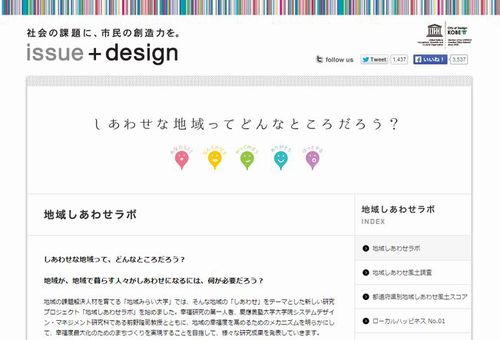December 4, 2014
Study Project Begins Seeking Happy Local Communities
Keywords: Civil Society / Local Issues Well-Being

Copyright Local-Happiness Lab All Rights Reserved.
What factors are essential for local regions and their residents to be happy? This is the theme of a new study project named "Local-Happiness Lab," which recently started in Japan. We would like to report on part of this study by reprinting an article from the website of the Institute for Studies in Happiness, Economy and Society, of which Japan for Sustainability is an outreach partner.
"Chiiki Mirai Daigaku--Social Design School to cultivate human resources for solving local issues," established by six companies and organizations, including issue+design and Hakuhodo Inc., started the Local-Happiness Lab project in April 2014. The project aims to find a mechanism to boost regional happiness and happiness of residents, with the theme of essential elements for making regions and their residents feel happy?
The study notes four factors as being essential for making people feel happy; self-realization and growth, relationships and thanks, forward-thinking and positivity, and independence and keeping one's own pace. Adding one more factor, safety and reassurance, to these four factors, these five indexes were used to measure the level of achievement of local happiness. The project considers people to be happy when they have opportunities for growth and self-realization, for maintaining important relationships, for ensuring independence, and for acting positively, together with the certainty of basic necessities like food and safety from attack.
A survey was conducted on these five indexes, targeting 15,000 people across the nation, as part of this study project. For this evaluation, the survey comprised two groups of questions in order to investigate actual conditions from two aspects: "wind" questions focusing on the feelings of individual residents regarding each of the five indexes, and "earth" questions focusing on social receptivity and social climate to support these indexes.
The results are as follows. In the responses to the wind questions that measure how happy an individual resident feels, Okinawa Prefecture was ranked top, and several prefectures in Kyushu were ranked high, while big city regions were also ranked high, including Tokyo (2nd), Hyogo (6th) and Kyoto (9th). In responses to the earth questions that measure social aspects the local region, Okinawa again finished top by a large margin over second place, and three prefectures in Kyushu also ranked in the top five. Interestingly, Kochi Prefecture which ranked 44th on the wind questions, ranked fourth here, while Tokyo, second in the wind questions, ranked 19th. In the overall ranking, Okinawa finished top with a much higher score than other regions, thus showing Okinawa's richness in factors related to the growth of local happiness. Kagoshima Prefecture was ranked second, Kumamoto Prefecture was third, and Miyazaki Prefecture was fourth. Six prefectures in the Kyushu-Okinawa regions appeared in the top ten. However, Tokyo finished fifth overall, while Hyogo, Ishikawa and Iwate prefectures also finished in the top ten, which shows that local regions with good "wind" and "earth" scores are scattered across the nation.
Happiness Studies News, Institute for Studies in Happiness, Economy and Society
http://ishes.org/en/happy_news/
Related
"JFS Newsletter"
- 'Good Companies in Japan' (Article No.4): 'Eightfold Satisfaction' Management for Everyone's Happiness
- "Nai-Mono-Wa-Nai": Ama Town's Concept of Sufficiency and Message to the World
- 'Good Companies in Japan' (Article No.3): Seeking Ways to Develop Societal Contribution along with Core Businesses
- "Good Companies in Japan" (Article No. 2): Seeking "Happiness" for All Stakeholders
- "Good Companies in Japan" (Article No. 1): Valuing Employee Happiness and Trust
Related
"Popular Articles"
- Study Project Begins Seeking Happy Local Communities
- Itochu to Ban Late Night Overtime and Encourage Morning-focused Working Style
- Japan Ranks Sixth in Child Overall Well-being, but 21st in Material Well-being
- Japan's Cabinet Office Launches Website Providing Data on Women in the Workplace
- Japanese Women Still Struggle to Find Employment after Having Children, Cabinet Survey Shows


